Fleurs du Mal Magazine



Selfie
van Gerrit Achterberg
Hoe zal nu in het huis de stilte zijn?
Val ik tezamen met uw lijn?
Mijn ledematen worden van ivoor.
Ik ben bij u gekomen, binnendoor.
Nooit was ik zo geheel en zo bijeen
terechtgekomen, ogen wijd uiteen.
Ontschorste bomen liggen aan de kant.
God heeft een buiten- en een binnenkant.
Bert Bevers
Hoe zal nu in het huis de stilte zijn? is een sample uit Distantie
Val ik tezamen met uw lijn? is een sample uit 13
Mijn ledematen worden van ivoor. is een sample uit Smaragd
Ik ben bij u gekomen, binnendoor. is een sample uit Oculair
Nooit was ik zo geheel en zo bijeen. is een sample uit Tracé
Terechtgekomen, ogen wijd uiteen is een sample uit Lucifer
Ontschorste bomen liggen aan de kant is een bijna-sample uit Station
God heeft een buiten- en een binnenkant. is een sample uit Reflexie
Selfie van Gerrit Achterberg
Verschenen in Je tikt er tegen en het zingt, Demer Uitgeverij, Leusden, 2015
Bert Bevers is a poet and writer who lives and works in Antwerp (Be)
• fleursdumal.nl magazine
More in: Achterberg, Gerrit, Archive A-B, Archive A-B, Bevers, Bert
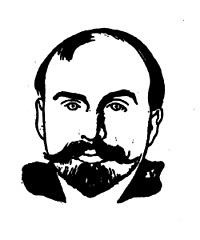
Hugo
J’ai un portrait d’Hugo, en face sur le mur,
Et quand je le regarde, et quand le vers est dur
A terminer, son oeil, et sa barbe si douce
Me donnent bon courage et les mots sous son pouce
S’alignent sans efforts et je relis ses vers
Si doux et si charmants, plus calmes que les mers.
“J’étais seul près des flots par une nuit d’étoiles;
“Pas un nuage au ciel, sur la mer pas de voiles,
“Mes yeux plongeaient plus loin que le monde réel
“Et les bois et les monts, et toute la nature
“Semblaient interroger dans un confus murmure
“Les flots des mers, les feux du ciel.”
. . . . . . . . . . . .
. . . . . . . . . . . .
Marcel Schwob
(1867-1905)
Hugo
Mai 1881
Portrait: Félix Vallotton
• fleursdumal.nl magazine
More in: Archive S-T, Archive S-T, Félix Vallotton, Marcel Schwob, Victor Hugo
1677. Un groupe d’intellectuels publie à Amsterdam un livre intitulé Œuvres posthumes avec pour nom d’auteur : B.d.S.
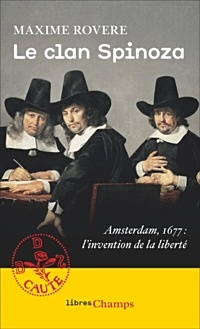 Qui se cache derrière ces initiales? Bento de Spinoza, certes… mais pas seulement.
Qui se cache derrière ces initiales? Bento de Spinoza, certes… mais pas seulement.
Son livre est le produit d’échanges palpitants entre les savants de toute l’Europe, de querelles entre les communautés juives et chrétiennes mal unies, d’amitiés éternelles et même d’amours déçues.
Cette fantaisie historique et philosophique, entièrement fondée sur les faits et les textes, transforme la biographie du philosophe Spinoza en un fascinant portrait d’hommes et de femmes épris de liberté, lancés dans l’aventure de la raison moderne.
Synthèse de décennies de recherches collectives, le roman de Maxime Rovere éclaire la naissance et les enjeux d’une philosophie qui n’en finit pas de nous aider à comprendre le monde, et nous avec lui.
Maxime Rovere
Le clan Spinoza
Amsterdam, 1677.
L’invention de la liberté
Littérature française
Libres Champs
560 pages
109 x 178 mm
Broché
Paru le 23/01/2019
EAN : 9782081422506
ISBN : 9782081422506
Prix : €10,00
# more books
Maxime Rovere
Le clan Spinoza
Littérature française
• fleursdumal.nl magazine
More in: - Book News, - Book Stories, Archive Q-R, Archive S-T, Art & Literature News, Spinoza
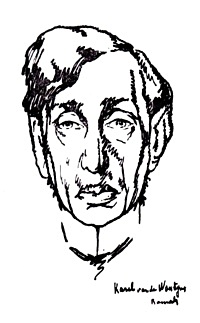
Er komt iemand bij mij
Er komt iemand bij mij, die ‘k nimmer zag,
en uit-der-mate vriendlijk, die mij zegt:
‘Gij weet, ik berg iemand in mijne woon.
Neen: er verbergt zich iemand in mijn woon.
Ik zie hem niet, maar ben in hem begaan.
Ik ken hem, en hij is mijn liefst bezit…’
– Ik durf niet zeggen dat die vreemdling liegt.
Ik durf niet zeggen dat zijn gast de mijne is. Ach!
ik durf niet zèggen dat hij niet bestaat, misschien.
Want hij bestaat in mij.
Karel van de Woestijne
(1878 – 1929)
Er komt iemand bij mij
Portret: Karel van de Woestijne, Ramah – Journal Het Roode Zeil, 15 April 1920
• fleursdumal.nl magazine
More in: Archive W-X, Archive W-X, Woestijne, Karel van de
THE INTERFERENCE OF PATSY ANN
Patsy Ann Meriweather would have told you that her father, or more properly her “pappy,” was a “widover,” and she would have added in her sad little voice, with her mournful eyes upon you, that her mother had “bin daid fu’ nigh onto fou’ yeahs.” Then you could have wept for Patsy, for her years were only thirteen now, and since the passing away of her mother she had been the little mother for her four younger brothers and sisters, as well as her father’s house-keeper.
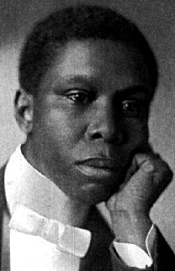 But Patsy Ann never complained; she was quite willing to be all that she had been until such time as Isaac and Dora, Cassie and little John should be old enough to care for themselves, and also to lighten some of her domestic burdens. She had never reckoned upon any other manner of release. In fact her youthful mind was not able to contemplate the possibility of any other manner of change. But the good women of Patsy’s neighbourhood were not the ones to let her remain in this deplorable state of ignorance. She was to be enlightened as to other changes that might take place in her condition, and of the unspeakable horrors that would transpire with them.
But Patsy Ann never complained; she was quite willing to be all that she had been until such time as Isaac and Dora, Cassie and little John should be old enough to care for themselves, and also to lighten some of her domestic burdens. She had never reckoned upon any other manner of release. In fact her youthful mind was not able to contemplate the possibility of any other manner of change. But the good women of Patsy’s neighbourhood were not the ones to let her remain in this deplorable state of ignorance. She was to be enlightened as to other changes that might take place in her condition, and of the unspeakable horrors that would transpire with them.
It was upon the occasion that little John had taken it into his infant head to have the German measles just at the time that Isaac was slowly recovering from the chicken-pox. Patsy Ann’s powers had been taxed to the utmost, and Mrs. Caroline Gibson had been called in from next door to superintend the brewing of the saffron tea, and for the general care of the fretful sufferer.
To Patsy Ann, then, in ominous tone, spoke this oracle. “Patsy Ann, how yo’ pappy doin’ sence Matildy died?” “Matildy” was the deceased wife.
“Oh, he gittin’ ‘long all right. He was mighty broke up at de fus’, but he ‘low now dat de house go on de same’s ef mammy was a-livin’.”
“Oom huh,” disdainfully; “Oom huh. Yo’ mammy bin daid fou’ yeahs, ain’t she?”
“Yes’m; mighty nigh.”
“Oom huh; fou’ yeahs is a mighty long time fu’ a colo’d man to wait; but we’n he do wait dat long, hit’s all de wuss we’n hit do come.”
“Pap bin wo’kin right stiddy at de brick-ya’d,” said Patsy, in loyal defence against some vaguely implied accusation, “an’ he done put some money in de bank.”
“Bad sign, bad sign,” and Mrs. Gibson gave her head a fearsome shake.
But just then the shrill voice of little John calling for attention drew her away and left Patsy Ann to herself and her meditations.
What could this mean?
When that lady had finished ministering to the sick child and returned, Patsy Ann asked her, “Mis’ Gibson, what you mean by sayin’ ‘bad sign, bad sign?'”
Again the oracle shook her head sagely. Then she answered, “Chil’, you do’ know de dev’ment dey is in dis worl’.”
“But,” retorted the child, “my pappy ain’ up to no dev’ment, ‘case he got ‘uligion an’ bin baptised.”
“Oom-m,” groaned Sistah Gibson, “dat don’ mek a bit o’ diffunce. Who is any mo’ ma’yin’ men den de preachahs demse’ves? W’y Brothah ‘Lias Scott done tempted matermony six times a’ready, an’ ‘s lookin’ roun’ fu’ de sebent, an’ he’s a good man, too.”
“Ma’yin’,” said Patsy breathlessly.
“Yes, honey, ma’yin’, an’ I’s afeared yo’ pappy’s got notions in his haid, an’ w’en a widower git gals in his haid dey ain’ no use a-pesterin’ wid ’em, ‘case dey boun’ to have dey way.”
“Ma’yin’,” said Patsy to herself reflectively. “Ma’yin’.” She knew what it meant, but she had never dreamed of the possibility of such a thing in connection with her father. “Ma’yin’,” and yet the idea of it did not seem so very unalluring.
She spoke her thoughts aloud.
“But ef pap ‘u’d ma’y, Mis’ Gibson, den I’d git a chanct to go to school. He allus sayin’ he mighty sorry ’bout me not goin’.”
“Dah now, dah now,” cried the woman, casting a pitying glance at the child, “dat’s de las’ t’ing. He des a feelin’ roun’ now. You po’, ign’ant, mothahless chil’. You ain’ nevah had no step-mothah, an’ you don’ know what hit means.”
“But she’d tek keer o’ the chillen,” persisted Patsy.
“Sich tekin’ keer of ’em ez hit ‘u’d be. She’d keer fu’ ’em to dey graves. Nobody cain’t tell me nuffin ’bout step-mothahs, case I knows ’em. Dey ain’ no ooman goin’ to tek keer o’ nobody else’s chile lak she’d tek keer o’ huh own,” and Patsy felt a choking come into her throat and a tight sensation about her heart while she listened as Mrs. Gibson regaled her with all the choice horrors that are laid at the door of step-mothers.
From that hour on, one settled conviction took shape and possessed Patsy Ann’s mind; never, if she could help it, would she run the risk of having a step-mother. Come what may, let her be compelled to do what she might, let the hope of school fade from her sight forever and a day—but no step-mother should ever cast her baneful shadow over Patsy Ann’s home.
Experience of life had made her wise for her years, and so for the time she said nothing to her father; but she began to watch him with wary eyes, his goings out and his comings in, and to attach new importance to trifles that had passed unnoticed before by her childish mind.
For instance, if he greased or blacked his boots before going out of an evening her suspicions were immediately aroused and she saw dim visions of her father returning, on his arm the terrible ogress whom she had come to know by the name of step-mother.
Mrs. Gibson’s poison had worked well and rapidly. She had thoroughly inoculated the child’s mind with the step-mother virus, but she had not at the same time made the parent widow-proof, a hard thing to do at best. So it came to pass that with a mysterious horror growing within her, Patsy Ann saw her father black his boots more and more often and fare forth o’ nights and Sunday afternoons.
Finally her little heart could contain its sorrow no longer, and one night when he was later than usual she could not sleep. So she slipped out of bed, turned up the light, and waited for him, determined to have it out, then and there.
He came at last and was all surprise to meet the solemn, round eyes of his little daughter staring at him from across the table.
“W’y, lady gal,” he exclaimed, “what you doin’ up at ‘his time?”
“I sat up fu’ you. I got somep’n’ to ax you, pappy.” Her voice quivered and he snuggled her up in his arms.
“What’s troublin’ my little lady gal now? Is de chillen bin bad?”
She laid her head close against his big breast, and the tears would come as she answered, “No, suh; de chillen bin ez good az good could be, but oh, pappy, pappy, is you got gal in yo’ haid an’ a-goin’ to bring me a step-mothah?”
He held her away from him almost harshly and gazed at her as he queried, “W’y, you po’ baby, you! Who’s bin puttin’ dis hyeah foolishness in yo’ haid?” Then his laugh rang out as he patted her head and drew her close to him again. “Ef yo’ pappy do bring a step-mothah into dis house, Gawd knows he’ll bring de right kin’.”
“Dey ain’t no right kin’,” answered Patsy.
“You don’ know, baby; you don’ know. Go to baid an’ don’ worry.”
He sat up a long time watching the candle sputter, then he pulled off his boots and tiptoed to Patsy’s bedside. He leaned over her. “Po’ little baby,” he said; “what do she know about a step-mothah?” And Patsy saw him and heard him, for she was awake then, and far into the night.
In the eyes of the child her father stood convicted. He had “gal in his haid,” and was going to bring her a step-mother; but it would never be; her resolution was taken.
She arose early the next morning and after getting her father off to work as usual, she took the children into hand. First she scrubbed them assiduously, burnishing their brown faces until they shone again. Then she tussled with their refractory locks, and after that she dressed them out in all the bravery of their best clothes.
Meanwhile her tears were falling like rain, though her lips were shut tight. The children off her mind, she turned her attention to her own toilet, which she made with scrupulous care. Then taking a small tin-type of her mother from the bureau drawer, she put it in her bosom, and leading her little brood she went out of the house, locking the door behind her and placing the key, as was her wont, under the door-step.
Outside she stood for a moment or two, undecided, and then with one long, backward glance at her home she turned and went up the street. At the first corner she paused again, spat in her hand and struck the watery globule with her finger. In the direction the most of the spittle flew, she turned. Patsy Ann was fleeing from home and a step-mother, and Fate had decided her direction for her, even as Mrs. Gibson’s counsels had directed her course.
The child had no idea where she was going. She knew no one to whom she might turn in her distress. Not even with Mrs. Gibson would she be safe from the horror which impended. She had but one impulse in her mind and that was to get beyond the reach of the terrible woman, or was it a monster? who was surely coming after her. On and on she walked through the town with her little band trudging bravely along beside her. People turned to look at the funny group and smiled good-naturedly as they passed, and one man, a little more amused than the rest, shouted after them, “Where you goin’, sis, with that orphan’s home?”
But Patsy Ann’s dignity was impregnable. She walked on with her head in the air, the desire for safety tugging at her heart.
The hours passed and the gentle coolness of morning turned into the fierce heat of noon, and still with frequent rests they trudged on, Patsy ever and anon using her divining hand, unconscious that she was doubling and redoubling on her tracks. When the whistles blew for twelve she got her little brood into the shade of a poplar tree and set them down to the lunch which, thoughtful little mother that she was, she had brought with her. After that they all stretched themselves out on the grass that bordered the sidewalk, for all the children were tired out, and baby John was both sleepy and cross. Even Patsy Ann drowsed and finally dropped into the deep slumber of childhood. They looked too peaceful and serene for passers-by to bother them, and so they slept and slept.
It was past three o’clock when the little guardian awakened with a start, and shook her charges into activity. John wept a little at first, but after a while took up his journey bravely with the rest.
She had just turned into a side street, discouraged and bewildered, when the round face of a coloured woman standing in the doorway of a whitewashed cottage caught her eye and attention. Once more she paused and consulted her watery oracle, then turned to encounter the gaze of the round-faced woman. The oracle had spoken and she turned into the yard.
“Whaih you goin’, honey? You sut’ny look lak you plumb tukahed out. Come in an’ tell me all ’bout yo’se’f, you po’ little t’ing. Dese yo’ little brothas an’ sistahs?”
“Yes’m,” said Patsy Ann.
“W’y, chil’, whaih you goin’?”
“I don’ know,” was the truthful answer.
“You don’ know? Whaih you live?”
“Oh, I live down on Douglas Street,” said Patsy Ann, “an’ I’s runnin’ away f’om home an’ my step-mothah.”
The woman looked keenly at her.
“What yo’ name?” she said.
“My name’s Patsy Ann Meriweather.”
“An’ is yo’ got a step-mothah?”
“No,” said Patsy Ann, “I ain’ got none now, but I’s sut’ny ‘spectin’ one.”
“What you know ’bout step-mothahs, honey?”
“Mis’ Gibson tol’ me. Dey sho’ly is awful, missus, awful.”
“Mis’ Gibson ain’ tol’ you right, honey. You come in hyeah and set down. You ain’ nothin’ mo’ dan a baby yo’se’f, an’ you ain’ got no right to be trapsein’ roun’ dis away.”
Have you ever eaten muffins? Have you eaten bacon with onions? Have you drunk tea? Have you seen your little brother John taken up on a full bosom and rocked to sleep in the most motherly way, with the sweetness and tenderness that only a mother can give? Well, that was Patsy Ann’s case to-night.
And then she laid them along like ten-pins crosswise of her bed and sat for a long time thinking.
To Maria Adams about six o’clock that night came a troubled and disheartened man. It was no less a person than Patsy Ann’s father.
“Maria! Maria! What shall I do? Somebody don’ stole all my chillen.”
Maria, strange to say, was a woman of few words.
“Don’ you bothah ’bout de chillen,” she said, and she took him by the hand and led him to where the five lay sleeping calmly across the bed.
“Dey was runnin’ f’om home an’ dey step-mothah,” said she.
“Dey run hyeah f’om a step-mothah an’ foun’ a mothah.” It was a tribute and a proposal all in one.
When Patsy Ann awakened, the matter was explained to her, and with penitent tears she confessed her sins.
“But,” she said to Maria Adams, “ef you’s de kin’ of fo’ks dat dey mek step-mothahs out o’ I ain’ gwine to bothah my haid no mo’.”
Paul Laurence Dunbar
(1872 – 1906)
The Interference Of Patsy Ann. Short Story
From The Heart Of Happy Hollow, a collection of short stories reprinted in 1904 by Dodd, Mead and Company, New York.
Short Story
• fleursdumal.nl magazine
More in: Archive C-D, Archive C-D, Dunbar, Paul Laurence, Dunbar, Paul Laurence, Paul Laurence Dunbar, Paul Laurence Dunbar
Reel Verse is a unique Pocket Poets anthology of a hundred years of poetic tributes to the silver screen, from the silent film era to the present.
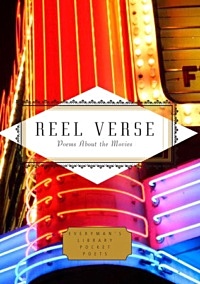 The variety of subjects is dazzling, from movie stars to bit players, from B-movies to Bollywood, from Clark Gable to Jean Cocteau.
The variety of subjects is dazzling, from movie stars to bit players, from B-movies to Bollywood, from Clark Gable to Jean Cocteau.
More than a hundred poets riff on their movie memories: Langston Hughes and John Updike on the theaters of their youth, Jack Kerouac and Robert Lowell on Harpo Marx, Sharon Olds on Marilyn Monroe, Louise Erdrich on John Wayne, May Swenson on the James Bond films, Terrance Hayes on early Black cinema, Maxine Kumin on Casablanca, and Richard Wilbur on The Prisoner of Zenda. Orson Welles, Leni Riefenstahl, and Ingmar Bergman share the spotlight with Shirley Temple, King Kong, and Carmen Miranda; Bonnie and Clyde and Ridley Scott with Roshomon, Hitchcock, and Bresson.
In Reel Verse, one of our oldest art forms pays loving homage to one of our newest—the thrilling art of cinema.
POPCORN PALACES
Meena Alexander, “South India Cinema” – John Allman, “Loew’s Triboro” – Robert Hayden, “Double Feature” – Robert Hershon, “1948: Saturdays” – Edward Hirsch, “The Skokie Theater” – Langston Hughes, “Movies” – Esther Lin, “Poem Ending in Antarctica” – Frank O’Hara, “Ave Maria” – Theodore Roethke, “Double Feature” – Jon Tribble, “Concessions” – John Updike, “Movie House” – Ellen Bryant Voigt, “At the Movies, Virginia, 1956”
FEATURE PRESENTATIONS
Amy Clampitt, “The Godfather Returns to Color TV” – Martha Collins, “Meanwhile” – Jane Cooper, “Seventeen Questions About King Kong” – Denise Duhamel, “An Unmarried Woman” – Amy Gerstler, “The Bride Goes Wild” – Allen Ginsberg, “The Blue Angel” – Juliana Gray, “Rope” – George Green, “Art Movies: The Agony and the Ecstasy” – Richard Howard, “King Kong (1933)” – Allison Joseph, “Imitation of Life” – Ron Koertge, “Aubade” – Maxine Kumin, “Casablanca” – Gerry LaFemina, “Variations on a Theme by Ridley Scott” – Laura McCullough, “Soliloquy with Honey: Time to Die” – John Murillo, “Enter the Dragon” – Stanley Plumly, “The Best Years of Our Life” – Anna Rabinowitz, “from Present Tense” – Philip Schultz, “Shane” – May Swenson, “The James Bond Movie” – Susan Terris, “Take Two: Bonnie & Clyde/Dashboard Scene” – Richard Wilbur, “The Prisoner of Zenda”
MORE STARS THAN IN HEAVEN
Frank Bidart, “Poem Ending with a Sentence by Heath Ledger” – Christopher Buckley, “For Ingrid Bergman,” – Gerald Costanzo, “Fatty Arbuckle” – Marsha de la O, “Janet Leigh is Afraid of Jazz” – Louise Erdrich, “Dear John Wayne” – Sonia Greenfield, “Celebrity Stalking” – Patricia Spears Jones, “Hud” – Jack Kerouac, “To Harpo Marx” – David Lehman, “July 13 from The Daily Mirror” – Vachel Lindsay, “Mae Marsh, Motion Picture Actress” – Patricia Lockwood, “The Fake Tears of Shirley Temple” – Robert Lowell, “Harpo Marx” – Sharon Olds, “The Death of Marilyn Monroe” – William Pillin, “You, John Wayne” – Nicole Sealey, “An Apology for Trashing Magazines in Which You Appear” – William Jay Smith, “Old Movie Stars” – John Wain, “Villanelle for Harpo Marx” – John Wieners, “Garbos and Dietrichs”
B MOVIES & BIT PLAYERS
Angela Ball, “To Lon Chaney in The Unknown” – Gregory Djanikian, “Movie Extras” Cornelius Eady, “Sam” – Martín Espada, “The Death of Carmen Miranda” – Kenneth Fearing, “St. Agnes’ Eve” – Edward Field, “Curse of the Cat Woman” – Richard Frost, “Horror Show” – Howard Moss, “Horror Movie” – Ogden Nash, “Viva Vamp, Vale Vamp” – Robert Polito, “Three Horse Operas” – Virgil Suarez, “Harry Dean Stanton is Dying” – David Trinidad, “Ode to Thelma Ritter” – William Trowbridge, “Elisha Cook, Jr.” – Chase Twichell, “Bad Movies, Bad Audience” – Marcus Wicker, “Love Letter to Pam Grier”
AUTEURS
Paul Carroll, “Ode to Fellini on Interviewing Actors for a Forthcoming Film” – René Char, “Antonin Artaud” – Robert Creeley, “Bresson’s Movies” – Robert Duncan, “Ingmar Bergman’s Seventh Seal” – James Franco, “Editing” – Major Jackson, “After Riefenstahl” – Claudia Rankine, “from Don’t Let Me Be Lonely” – Jean-Mark Sens, “In De Sica’s Bicycle Thief” – Vijay Seshadri, “Script Meeting” – David St. John, “from The Face, XXXVI” – Timothy Steele, “Last Tango” – Gerald Stern, “Orson” – Michael Waters, “Blue Ankle” – David Yezzi, “Stalker”
FLASHBACKS
Kim Addonizio, “Scary Movies” – Elizabeth Alexander, “Early Cinema” – John Berryman, “Dream Song #9” – Ryan Black, “This is Cinerama” – Richard Brautigan, “Mrs. Myrtle Tate, Movie Projectionist” – Kurt Brown, “Silent Film, DVD” – Elena Karina Byrne, “Easy Rider” – Nicholas Christopher, “Atomic Field, 1972 #6” – Rita Dove, “Watching Last Year at Marienbad at Roger Haggerty’s House in Auburn, Atlanta” – D. J. Enright,“A Grand Night” – Aniela Gregorek, “Cinema” – Joseph O. Legaspi, “At the Movies with My Mother” – Michael McFee, “My Mother and Clark Gable on the World’s Most Famous Beach” – Mihaela Moscaliuc, “Watching Tess in Romania, 1986” – Paul Muldoon, “The Weepies” – Carol Muske-Dukes, “Unsent Letter 4” – Tom Sleigh, “Newsreel” – Elizabeth Spires, “Mutoscope” – Michael Paul Thomas, “Movies in Childhood” – David Wojahn, “Buddy Holly Watching Rebel Without a Cause”
REMAKES
Billy Collins, “The Movies” – Carol Ann Duffy, “Queen Kong” – Albert Goldbarth, “Survey: Frankenstein Under the Front Porch Light” – Kimiko Hahn, “The Continuity Script: Rashomon” – Bruce F. Kawin, “Old Frankenstein” – Glyn Maxwell, “Disney’s Island” – Rajiv Mohabir, “Bollywood Confabulation” – Geoffrey O’Brien, “Voice Over” – Michael Ondaatje, “King Kong Meets Wallace Stevens” – Elise Paschen, “Red Lanterns” – Matthew Zapruder, “Frankenstein Love”
REEL LIFE
David Baker, “Violence” – Tom Clark, “Final Farewell” – Lucille Clifton, “Come Home from the Movies” – Hart Crane, “Chaplinesque” – Stephen Dunn, “At the Film Society” – Lynn Emanuel, “Blonde Bombshell” – Robert Hass, “Old Movie with the Sound Turned Off” – Terrance Hayes, “Variation on a Black Cinema Treasure: Broken Earth” – Marie Howe, “After the Movie” – Steven Huff, “Merton, Lax and My Father” – Ann Inoshita, “TV” – Weldon Kees, “Subtitle” – Haji Khavari, “Upon the Actor’s Longing for the Alienation Effect” – John Lucas, “Hollywood Nights” – Donna Masini, “A Fable” – William Matthews, “A Serene Heart at the Movies” – Eileen Myles, “Absolutely Earth” – Ishmael Reed, “Poison Light” – David Rigsbee, “Lincoln” – Muriel Rukeyser, “Movie” – Grace Schulman, “The Movie” – Gary Soto, “Hands” – George Yatchisin, “Single, Watching Fred and Ginger”
Reel Verse
Poems About the Movies
Edited by Michael Waters and Harold Schechter
Category: Poetry | Classics
Hardcover
256 Pages
Jan 22, 2019
Published by Everyman’s Library
ISBN 9781101908037
$14.95
# more poetry
Reel Verse
Poems About the Movies
• fleursdumal.nl magazine
More in: #More Poetry Archives, - Book News, Art & Literature News, AUDIO, CINEMA, RADIO & TV
Mels blijft even staan op de brug en kijkt uit over de Wijer. Was de beek vroeger blauwer?
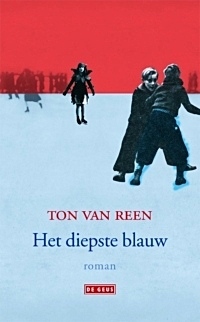 Is het echt waar dat ze vroeger tot op de bodem konden kijken omdat het water zo helder was als kristal, of herinnert hij zich dat zo omdat hij alles van vroeger idealiseert? Als ze in hun bootje zaten, voeren ze op een kleine rivier van stromend glas.
Is het echt waar dat ze vroeger tot op de bodem konden kijken omdat het water zo helder was als kristal, of herinnert hij zich dat zo omdat hij alles van vroeger idealiseert? Als ze in hun bootje zaten, voeren ze op een kleine rivier van stromend glas.
Het blauw dat hij in zijn geheugen heeft, was onzegbaar blauw. Het diepste blauw.
Hij sluit zijn ogen om zich dat blauw van de Wijer voor de geest te halen. De blauwe zomerkleur van het stromende water. Het blauw van de libellen. Het geel van de lisdodden. De spekwitte huid van de waterlelies.
Zonder nog op te kijken draait hij zijn rolstoel en rijdt naar huis.
Ton van Reen: Het diepste blauw (098)
wordt vervolgd
• fleursdumal.nl magazine
More in: - Book News, - Het diepste blauw, Archive Q-R, Reen, Ton van
Ein elsässischer Soldat im Ersten Weltkrieg entdeckt am Nachthimmel das Sternbild des Großen Burschen, das so schauderhaft ist, dass er niemandem davon erzählen kann.
 Ein junger Mann, der sich in die blinde Anja verliebt hat, muss feststellen, dass ihr Apartment von oben bis unten mit Beschimpfungen bekritzelt ist. Marcel, sechzehn Jahre alt, hinterlässt auf der Toilettenwand eines Erotiklokals seine Handynummer und den Namen Suzy.
Ein junger Mann, der sich in die blinde Anja verliebt hat, muss feststellen, dass ihr Apartment von oben bis unten mit Beschimpfungen bekritzelt ist. Marcel, sechzehn Jahre alt, hinterlässt auf der Toilettenwand eines Erotiklokals seine Handynummer und den Namen Suzy.
Familie Scheuch bekommt eines Tages Besuch von einem Herrn Ulrichsdorfer, der vorgibt, in ihrem Haus aufgewachsen zu sein, und einen Elektroschocker unter seinem geliehenen Anzugjackett verbirgt.
Das ganz und gar Unerwartete bricht in das Leben von Clemens J. Setz’ Figuren ein. Ihr Schöpfer erzählt davon einfühlsam, fast zärtlich. Durch Falltüren gestattet er uns Blicke auf rätselhafte Erscheinungen und in geheimnisvolle Abgründe des Alltags, man stößt auf Wiedergänger und auf Sätze, die einen mit der Zunge schnalzen lassen.
Der Trost runder Dinge ist ein Buch voller Irrlichter und doppelter Böden – radikal erzählt und aufregend bis ins Detail.
Clemens J. Setz wurde 1982 in Graz geboren, wo er Mathematik sowie Germanistik studierte und heute als Übersetzer und freier Schriftsteller lebt. 2011 wurde er für seinen Erzählband Die Liebe zur Zeit des Mahlstädter Kindes mit dem Preis der Leipziger Buchmesse ausgezeichnet. Sein Roman Indigo stand auf der Shortlist des Deutschen Buchpreises 2012 und wurde mit dem Literaturpreis des Kulturkreises der deutschen Wirtschaft 2013 ausgezeichnet. 2014 erschien sein erster Gedichtband Die Vogelstraußtrompete. Für seinen Roman Die Stunde zwischen Frau und Gitarre erhielt Setz den Wilhelm Raabe-Literaturpreis 2015.
Clemens J. Setz
Der Trost runder Dinge
Erzählungen
Erschienen: 11.02.2019
Gebunden
320 Seiten
ISBN: 978-3-518-42852-8
Suhrkamp Verlag AG
Mit Abbildungen
€ 24,00
# new books
Der Trost runder Dinge
Erzählungen
Clemens J. Setz
• fleursdumal.nl magazine
More in: #Short Stories Archive, - Book News, - Book Stories, Archive S-T, Art & Literature News, WAR & PEACE
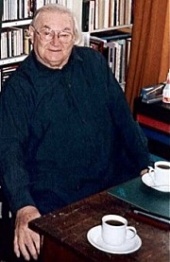 Jan Naaijkens was bekend als schrijver van proza, toneel, gedichten en liedjes.
Jan Naaijkens was bekend als schrijver van proza, toneel, gedichten en liedjes.
Daarnaast was hij een onderwijzer in hart en nieren. En niet te vergeten: radiopresentator, acteur, verzetsheld, én vader van 12 kinderen.
Jan Naaijkens heeft veel betekend voor de culturele emancipatie van Brabant in de periode na de Tweede Wereldoorlog.
Hij werd in februari 100 jaar oud. Op 17 april overleed Jan Naaijkens in zijn slaap.
Jan Naaijkens
(Hilvarenbeek, 10 februari 1919 – 17 april 2019)
# Meer over Jan Naaijkens in fleursdumal.nl magazine via deze link
# Link Jan Naaijkens op Wikipedia
• fleursdumal.nl magazine
More in: - Book Stories, Archive M-N, Archive M-N, Art & Literature News, AUDIO, CINEMA, RADIO & TV, Brabantia Nostra, FDM Art Gallery, In Memoriam, Jan Naaijkens, THEATRE
Originally from Limerick, Ireland, Majella Cullinane has lived in New Zealand since 2008.
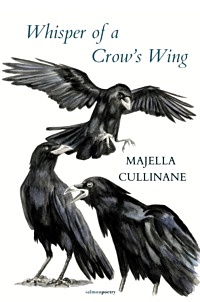 With an MLitt in Creative Writing from St. Andrew’s University, Scotland, in 2011, she published her first poetry collection, Guarding The Flame, with Salmon Poetry.
With an MLitt in Creative Writing from St. Andrew’s University, Scotland, in 2011, she published her first poetry collection, Guarding The Flame, with Salmon Poetry.
Her poems and short stories have been published in Ireland, the UK and New Zealand.
In 2014 she was awarded the Robert Burns Fellowship at Otago University, and in 2017 was the Sir James Wallace Trust/Otago University Writer in Residence at the Pah Homestead in Auckland.
She won the 2017 Caselberg International Prize for Poetry, and has been shortlisted for the Strokestown and Bridport International Poetry Prizes.
Better to consider
the small shapes in the gorgeous chaos of the world:
a snowflake flitting through the air,
swathes of blue and orange entangling the sky in their warm shawl,
glances to be tucked away like stones run smooth by rivers,
the shadows of our hands like wings, playing with the light.
Whisper of a Crow’s Wing
Author: Majella Cullinane
Language: English
Poetry
Paperback
100 pages
ISBN: 9781912561360
Publisher: Salmon Publishing
1 Dec. 2018
£10.00
# more poetry
Majella Cullinane
Whisper of a Crow’s Wing
• fleursdumal.nl magazine
More in: - Book News, Archive C-D, Archive C-D, Art & Literature News, Department of Ravens & Crows
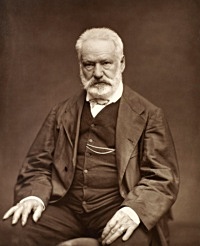
Chanson de grand-père
Dansez, les petites filles,
Toutes en rond.
En vous voyant si gentilles,
Les bois riront.
Dansez, les petites reines,
Toutes en rond.
Les amoureux sous les frênes
S’embrasseront.
Dansez, les petites folles,
Toutes en rond.
Les bouquins dans les écoles
Bougonneront.
Dansez, les petites belles,
Toutes en rond.
Les oiseaux avec leurs ailes
Applaudiront.
Dansez, les petites fées,
Toutes en rond.
Dansez, de bleuets coiffées,
L’aurore au front.
Dansez, les petites femmes,
Toutes en rond.
Les messieurs diront aux dames
Ce qu’ils voudront.
Victor Hugo
(1802-1885)
Chanson de grand-père
(Poème)
• fleursdumal.nl magazine
More in: Archive G-H, Archive G-H, Hugo, Victor, Victor Hugo
La cathédrale Notre-Dame ravagée par les flammes
Le feu a pris dans les combles du monument le plus visité d’Europe un peu avant 19 heures.
Le Monde, 15 Avril 2019 à 19h50
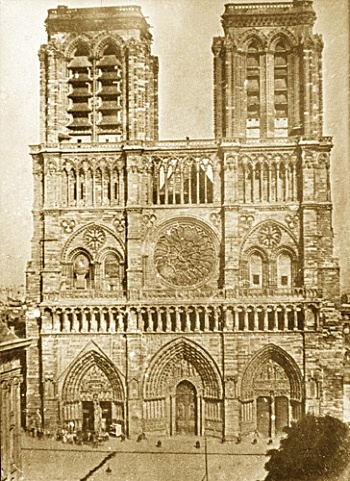
Notre-Dame de Paris
Ce poème vivant, seconde Notre-Dame,
Qui doit se voir encore debout à l’horizon,
Quand l’autre qui l’inspire et dont il prend le nom,
Aura dans la poussière exhalé sa grande âme ;
Ce colosse qu’un soir de son rêve de flamme
L’artiste a vu sortir, fait d’or et de limon,
Ce chant aux mille échos, où l’ange et le démon
Mêlent le cri du tigre au soupir de la femme ;
Ce livre de l’enfer et du ciel, le voici :
Lisez, mais si vers vous un pauvre enfant transi
Tend la main pour sa sœur qui danse sur la place,
Donnez, ne comptez pas, c’est Dieu qui comptera ;
Donnez, que votre cœur, en voyant l’humble tasse,
Se rappelle toujours la brune Esméralda.
Antoine de Latour
(1808-1881)
Poème: Notre-Dame de Paris (1835)
• fleursdumal.nl magazine
More in: #More Poetry Archives, Archive K-L, CATHEDRALS, FDM in Paris, The talk of the town
Thank you for reading Fleurs du Mal - magazine for art & literature